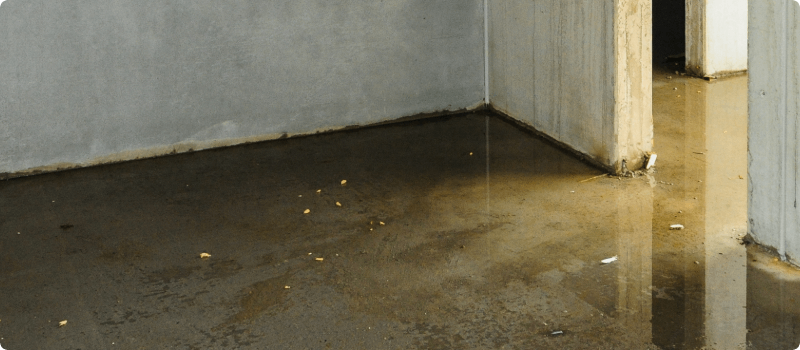Need flood coverage?
Inland Flood coverage helps financially protect you from flash flood damage. Covered events include flooding from inland waters overflowing onto normally dry land.*
Updated March 27, 2019 . AmFam Team
If you find your basement floor submerged under a foot of water, don’t panic. You’ve got this! Act quickly enough and you’ll be able to avoid the common ill effects that come with a flood — things like the ruining of personal belongings, loss of your basement’s usability and a number of threats to your family’s health.
Inland Flood coverage helps financially protect you from flash flood damage. Covered events include flooding from inland waters overflowing onto normally dry land.*
As the lowest level of your home, your basement is the part of your home most susceptible to flooding. There are a number of reasons your basement could flood. Here are some of the most common causes:
Heavy rain, water-saturated ground and the pressure that results can cause cracks in your foundation, leaving your basement vulnerable to groundwater and other moisture.
Pipe leaks are common. When you notice a minor leak in your plumbing, have it corrected immediately — plenty of floods caused by faulty pipes start as small leaks that could have been fixed affordably early on.
A sump pump defends your basement from floods by pumping encroaching water away from your home. But when it fails, it leaves your basement vulnerable to flooding.
If your gutters and downspouts are full of leaves, ice or aren’t disposing of water far enough away from your home, that water could make its way into your basement.

It’s easy to panic and think the worst when you notice that your basement is flooded. Take a deep breath and follow these steps carefully to mitigate the damage and get your life back to normal as soon as possible:
Floods come with a whole host of problems beyond the damage to your belongings and your house’s structure. Before you enter your flooded basement, homeowners should check thoroughly for these dangers:
Once you’ve made sure your home is safe to enter, it’s time to figure out what caused your home to flood.
If the source is a burst pipe, turn off your water supply. If it’s from something else like a flooded body of water or heavy rain, wait until the storm has passed and conditions have improved before clearing out the water.
After you’ve identified the source of the flooding and can be certain that it’s done pouring water into your basement, it’s time to clean up the mess. Use a wet/dry vacuum, water pumps, mops, buckets or enlist the help of a professional cleanup company to get the water out.
Time is of the essence when cleaning up your flooded basement. Water and residual moisture are a perfect breeding ground for mold, mildew and harmful bacteria that could endanger your family’s health and further damage your home and belongings.

Not all flooded basements can be handled by homeowners. Sometimes, it’s best to call professionals and let them do what they do best. Be sure to reach out to professionals right away in the following situations:
Contact a plumber and turn off the main water valve, if possible.
Any sort of issues with your electricity should lead you to evacuate your home right away and call an electrician and your electric company.
Contact a plumber and don’t use any plumbing or water until they can assess the situation.
Furnaces are often impacted and damaged during floods. If yours has fallen victim to the intruding water, contact an HVAC professional right away.

Here are a few tried-and-true ways to keep rain on the lawn and away from your home:
Keep them clean and damage-free. Use downspout extensions to direct water away from your foundation.
Use plastic covers to keep rain from filling your window wells and seeping into your basement.
Replace missing shingles, repair damage and keep flashing sealed.
Fill cracks and holes to prevent water from seeping into your basement.
Using dirt, slope your lawn away from your foundation and keep plants at least three feet away from your home.
Check on it regularly — it’s a good friend to have working in your favor when the rain starts pouring! You also might consider installing a battery backup, so your home is protected if the power goes out in a storm.

Water damage to your home can be caused by many problems — some are covered by your homeowners insurance, and some aren’t. So, does homeowners insurance cover water damage in your basement when your washing machine malfunctions?
The answer to that depends on a few factors. If the damage was sudden and not the result of a lack of maintenance, you will likely be able to file a claim.
There are several instances where homeowners insurance will cover a water damage to the basement. Although it’s not typically called “basement flood insurance,” your homeowners coverage will help protect your finances when your basement floods due to a covered loss.
In most cases, you’ll be covered if the water damage is sudden or accidental. Proper maintenance of your appliances is key, and issues related to normal wear and tear are usually not considered a covered loss. Here’s a list of common issues where homeowners insurance for a flooded basement will usually cover you:
Sometimes, basement flooding and homeowners insurance don’t mix. A standard home insurance policy usually has limits to the way it covers flooded basements. But there is some good news. You can pick up added coverage to better protect your basement from flood damage. Here are a few examples of basement flooding that probably won’t be covered by your insurance:

Contact your American Family Insurance agent as soon as possible when you notice damage to your basement. And before any sort of damage ever occurs, talk with your agent about getting the protection and peace of mind you deserve — they’re always happy to help.
This information represents only a brief description of coverages, is not part of your policy, and is not a promise or guarantee of coverage. If there is any conflict between this information and your policy, the provisions of the policy will prevail. Insurance policy terms and conditions may apply. Exclusions may apply to policies, endorsements, or riders. Coverage may vary by state and may be subject to change. Some products are not available in every state. Please read your policy and contact your agent for assistance.
*Coverage provided by adding the Inland Flood optional endorsement. This endorsement does not satisfy mandatory flood insurance coverage should it be required by your federally regulated lender for your home mortgage or loan. This insurance product is not affiliated with the National Flood Insurance Program (NFIP). Please check with your agent and read the policy and endorsements for exact details on coverage limits and exclusions. Coverage applies after the property deductible has been met.